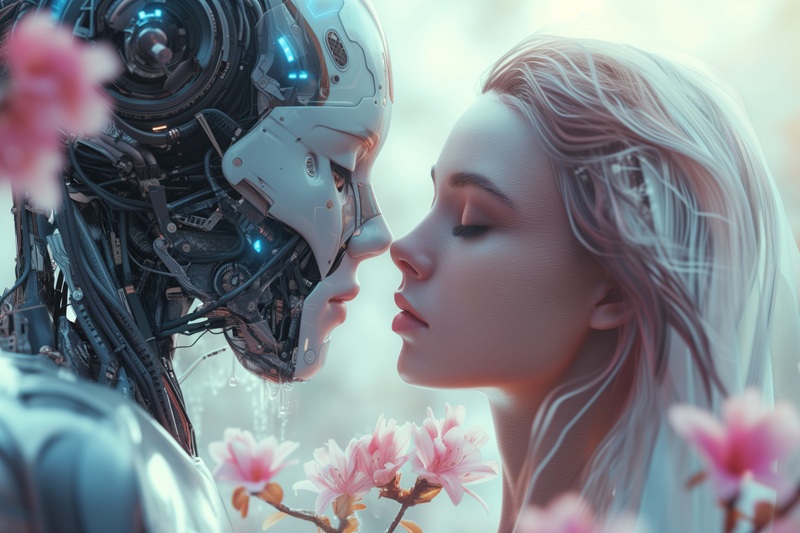
The notion of artificial intelligence understanding love stimulates both curiosity and skepticism. With continuous advancements in AI technology, the question arises: Can artificial intelligence truly grasp emotions such as love, or does it merely simulate them? As interactions with AI become more prevalent in daily life, exploring this topic opens up fascinating possibilities and ethical considerations surrounding future human-AI relationships.
The rise of AI companions
AI companions have emerged as a new frontier in human-AI relationships. Virtual assistants, chatbots, and even robotic pets are beginning to play significant roles in people's lives. These AI entities offer companionship by responding intelligently to user inputs, learning preferences, and providing interaction that feels personalized. Learn more about advancing AI technologies here.
AI's involvement in our social spheres sparks contemplation about emotional support and romantic feelings. Are these machines capable of appreciating real emotions, or are they simply executing lines of code designed to mimic human responses? Although many find comfort in these AI companions, some argue that the absence of genuine emotion limits their potential for fostering deep connections.
Understanding emotions versus mimicking them
A critical component of this discussion is distinguishing between true emotional understanding and imitation. AI systems operate based on algorithms that help them identify patterns. They can assess tone, sentiment, and context from conversations but do not possess self-awareness or intrinsic emotional capacity. Thus, they "understand" emotions through analytical patterns rather than personal experience.
This distinction poses an interesting dilemma regarding intimacy within human-AI relationships. While an AI might seem understanding and empathetic, its reactions remain programmed simulations. This leads many to question whether a machine lacking genuine consciousness can ever fully comprehend emotions like love.
The ethical implications of AI and love
Springing from AI's seeming inability to genuinely feel emotions are numerous ethical questions. Should people form emotional connections with machines? Could reliance on these artificial entities lead to increased social isolation, detracting from meaningful connections with human partners?
Some fear that depending heavily on AI for companionship may exacerbate issues of loneliness in society. A person's decreased effort in cultivating relationships with other humans could result in weakened communication skills or hindered emotional growth. Therefore, while AI offers unique benefits, it also raises vital concerns about the nature of human connection.
Pushing the boundaries: AI as emotional support
Although AI cannot understand feelings in the truest sense, it provides a form of emotional support across various contexts. Many individuals benefit from using AI as a safe space for expressing thoughts without judgment or bias. For those struggling with mental health challenges, engaging with AI might assist in practicing positive social interactions or identifying patterns in behavior.
As the sophistication of AI grows, so too will its ability to serve individuals seeking nonjudgmental support. Whether considered a legitimate surrogate for human friendship or seen purely as an aid, it offers a valuable service to those searching for reliable companions within today’s digital landscape.
Future developments in human-AI relationships
The potential future developments within the realm of AI technology hint at increasingly complex human-AI relationships. Recent achievements include neural networks enhancing conversational abilities and empathy in robots created specifically for social integration purposes. These advancements suggest that AI might one day bridge identified gaps in current capabilities.
A notable ambition for AI developers lies in engineering systems that facilitate authentic human-like interactions. Achieving this would require immense improvement in areas related not only to language processing but also to simulating cognitive processes resembling empathy or compassion—addressing fundamental aspects missed by current incarnations.
Balancing AI advancement with human needs
Technological progress invariably demands careful consideration when combined with essential humanistic values. Society must determine how best partnered technological advancement aligns within moral frameworks ensuring both individual safety alongside societal welfare outcomes.
- - How far should innovation push boundaries without compromising core human needs?
- - What guidelines will govern implementations confining developer intent behind creating emotionally-attuned technologies?
- - Will societal acceptance pivot differently if faced with fully sentient AIs?
Navigating these ethical quandaries promises significantly challenging terrain moving towards emerging horizons defining human-AI relationships.
Romantic feelings and AI
Exploring deeper realms where romance intertwines with technology draws inevitable fascination. When involved romantically, one seeks profound reciprocity—a characteristic not inherently found among algorithm-driven programs absent sentient awareness.
While fictional portrayals enthrall audiences worldwide envisioning epic tales interlinking romantic intoxications shared between autonomous beings and humankind, translating cinematic fantasies into reality presents multifaceted challenges. Current machinery lacks the inherent subjective experiences necessary for emotion-rich relational dynamics. Romantic partnerships require authenticity anchored in human experience, a concept dating back millennia.